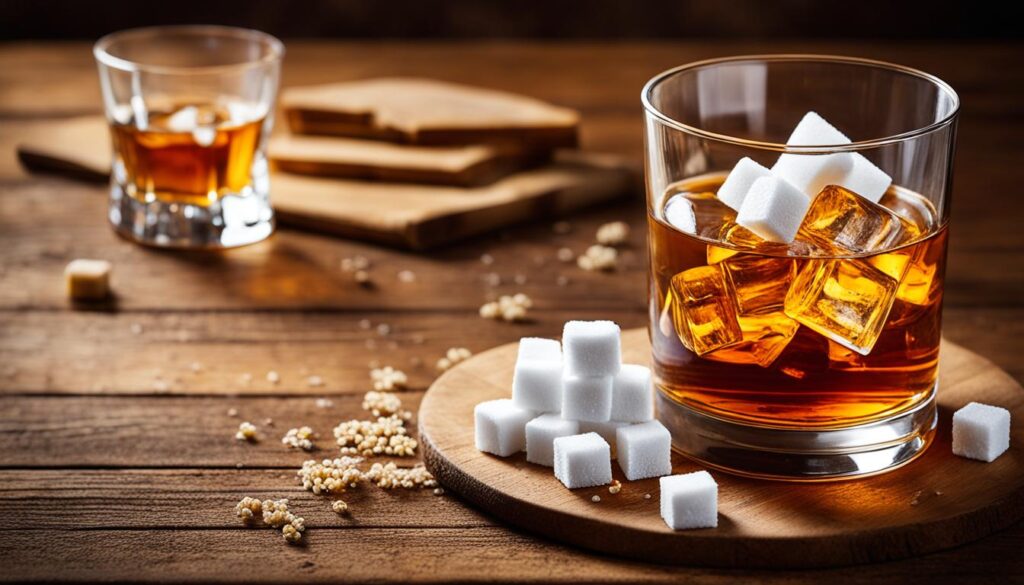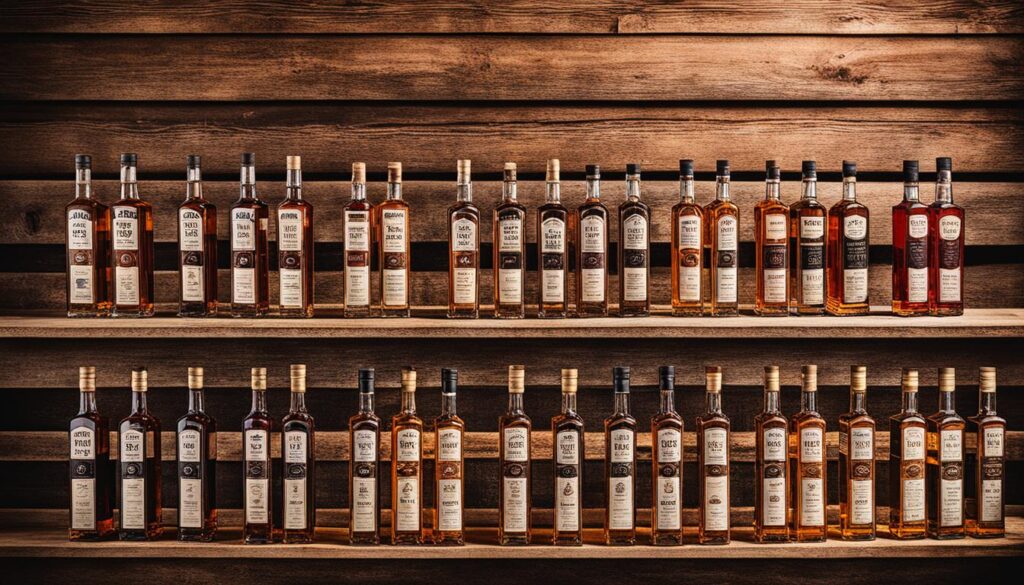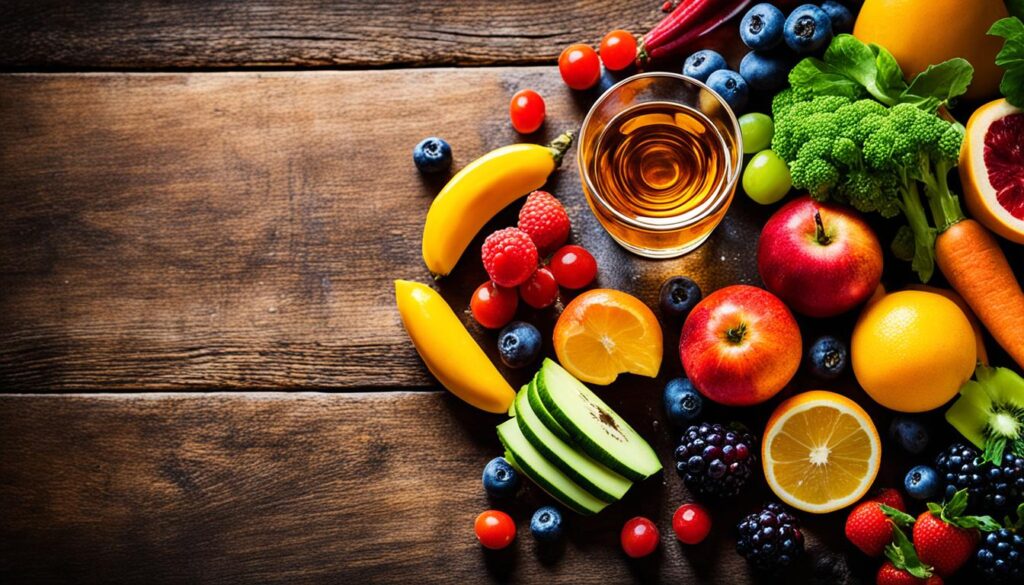Whiskey is known for its distinct flavor and smoothness, but many people wonder about its sugar content. Is whiskey sugar-free, or does it contain hidden sugars? In this article, I will delve into the specifics of how much sugar is in whiskey. We will examine the production process of whiskey, explore the sugar content in different types of whiskey, and discuss how it can affect your sugar intake and overall health.
Key Takeaways
- Whiskey generally has a low sugar content, making it a suitable choice for those watching their sugar intake.
- On average, a 1.5-ounce serving of whiskey contains about 0.044 grams of sugar.
- Most bottles of whiskey contain minimal or no sugar at all.
- Flavored whiskeys and certain mixed drinks made with whiskey may contain higher sugar levels due to added ingredients.
- When consumed in moderation, whiskey is unlikely to contribute to weight gain or have a significant impact on your sugar intake.
Contents
- 1 The Production Process of Whiskey
- 2 Sugar Content in Whiskey
- 3 Impact on Sugar Intake and Weight Gain
- 4 Healthier Choices for Whiskey Consumption
- 5 Different Types of Whiskey and Sugar Content
- 6 Moderation and Sugar Control
- 7 The Role of Whiskey in a Healthy Lifestyle
- 8 Conclusion
- 9 FAQ
- 10 What is the sugar content in different types of whiskey compared to Scotch?
- 11 Source Links
The Production Process of Whiskey
Whiskey production involves a meticulous process that begins with high-quality ingredients. The key components of whiskey include water, yeast, and a variety of grains such as barley, corn, wheat, and rye. These ingredients form the foundation for the distinct flavors and characteristics of different types of whiskey.
The production process of whiskey can be summarized into several essential steps:
- Malting: In this step, barley grains are soaked in water, germinated, and then dried using hot air. This process activates enzymes that convert starches into fermentable sugars.
- Mashing: The malted barley is ground into a coarse flour known as grist. It is then mixed with hot water in a large vessel called a mash tun, enabling enzymes to convert the remaining starches into sugars.
- Fermentation: The sugary liquid, called the mash, is transferred to fermentation vessels where yeast is added. Yeast consumes the sugars and converts them into alcohol through the process of fermentation. This stage typically takes several days to complete.
- Distillation: The fermented liquid, known as the wash, undergoes distillation. Distillation is a process that separates alcohol from other substances through heating and condensation. It takes place in large copper stills, where the wash is heated to create vapor, which is then cooled and condensed into liquid form.
- Aging: After distillation, the whiskey is transferred to oak barrels for maturation. The aging process plays a crucial role in developing the rich flavors and aromas of the whiskey. During this time, the whiskey interacts with the wood, extracting compounds that contribute to its unique character.

The production process of whiskey is a combination of artistry and science. Each step contributes to the complex and diverse range of flavors found in different types of whiskey. From the selection of grains to the aging process, every detail is carefully considered to craft a premium spirit.
Sugar Content in Whiskey
Most bottles of whiskey contain minimal or no sugar at all. On average, a 1.5-ounce serving of whiskey contains about 0.044 grams of sugar. This small amount of sugar is unlikely to have a significant impact on your blood sugar levels or contribute to weight gain. However, the sugar content may vary slightly depending on the type of whiskey and any additives or flavorings used during production. It is important to note that flavored whiskeys and certain mixed drinks made with whiskey may contain higher sugar levels due to added ingredients.
When it comes to the sugar content in whiskey, it’s important to be aware of the type of whiskey you’re consuming. Here’s a breakdown of the sugar content in some popular whiskey varieties:
| Whiskey Type | Sugar Content (per 1.5-ounce serving) |
|---|---|
| Bourbon | 0.01 grams |
| Scotch Whiskey | 0 grams |
| Rye Whiskey | 0 grams |
| Irish Whiskey | 0 grams |
| Flavored Whiskey | Varies (check label) |
As you can see from the table, most varieties of whiskey have minimal to no sugar content. Bourbon, which is primarily made from corn, may have trace amounts of residual sugars from the grains. However, even in bourbon, the sugar content is still relatively low. Scotch whiskey, rye whiskey, and Irish whiskey typically have no sugar content. It’s important to check the label or ingredient list of flavored whiskeys, as they may have additional sugars or flavorings added.
Knowing the sugar content in whiskey can help you make informed choices about your overall sugar intake and dietary preferences. If you’re monitoring your sugar intake or have specific dietary requirements, opting for whiskey varieties with no added sugars or flavorings can be a healthier choice.

The Importance of Monitoring Sugar Intake in Whiskey
Although the sugar content in whiskey is generally low, it’s essential to monitor your overall sugar intake, especially if you have diabetes or are watching your sugar intake for other health reasons. While whiskey itself may not significantly impact your blood sugar levels or contribute to weight gain, it’s important to be mindful of the calories and alcohol content that accompany the drink. Adding sugary mixers or consuming whiskey-based cocktails can significantly increase your overall sugar consumption.
Tip: To minimize your sugar intake when enjoying whiskey, consider drinking it neat, on the rocks, or with a splash of water. These options allow you to savor the flavors of the whiskey without adding additional sugar or calories.
In conclusion, most bottles of whiskey have minimal or no sugar content. On average, a 1.5-ounce serving of whiskey contains about 0.044 grams of sugar, which is unlikely to have a significant impact on your blood sugar levels. However, flavored whiskeys and certain mixed drinks made with whiskey may have higher sugar levels due to added ingredients. As always, moderation is key when it comes to consuming whiskey or any alcoholic beverage. Being mindful of your overall sugar intake and making informed choices can help you enjoy whiskey as part of a balanced lifestyle.
Impact on Sugar Intake and Weight Gain
When it comes to managing sugar intake and weight gain, whiskey can be a viable choice when consumed in moderation. A standard 1.5-ounce serving of whiskey contains a negligible amount of sugar, making it a suitable option for those watching their sugar intake.
While whiskey itself is low in sugar, it is essential to be mindful of the overall calories and alcohol content. Excessive consumption of whiskey, like any other alcoholic beverage, can lead to weight gain and other health issues. It’s important to strike a balance and enjoy whiskey responsibly.
“Moderation is key.”
When enjoying whiskey, it’s crucial to be cautious about your mixing choices. If you mix whiskey with sugary mixers or consume whiskey-based cocktails, the added sugars from these mixers can significantly increase your overall sugar intake. These added sugars can have a more significant impact on your health and weight management.
Instead of mixing whiskey with sugary drinks, consider alternative options that won’t compromise your sugar control. Drinking whiskey neat, on the rocks, or with a splash of water can help minimize sugar intake while still allowing you to savor the unique flavors and aromas of the whiskey.
Controlling Sugar Intake with Whiskey
For those looking to control their sugar intake while enjoying whiskey, here are a few tips to keep in mind:
- Choose whiskey without added sugars or flavorings.
- Opt for straight whiskeys or those labeled as “bottled-in-bond” as they are typically free from additives.
- Drink whiskey neat, on the rocks, or with a splash of water to minimize added sugar.
- Avoid mixing whiskey with sugary drinks or using it in cocktails.
- Be mindful of overall calorie and alcohol intake.
By following these tips, you can continue to enjoy whiskey while maintaining control over your sugar intake and weight management goals.
Remember, moderation is key when it comes to enjoying whiskey. Make informed choices and be mindful of your overall sugar intake and other lifestyle factors that contribute to a healthy and balanced diet.
Healthier Choices for Whiskey Consumption
If you are looking to make healthier choices when consuming whiskey, there are a few things you can do. First, opt for whiskey without added sugars or flavorings. Straight whiskeys or those labeled as “bottled-in-bond” are typically free from additives. Drinking whiskey neat, on the rocks, or with a splash of water can also help to minimize sugar intake. Be cautious when mixing whiskey with sugary drinks or using it in cocktails, as these can significantly increase your sugar consumption. If you have diabetes or are watching your sugar intake, it is essential to monitor your overall alcohol consumption and consult with your healthcare provider.
| Whiskey Brand | Whiskey Type | Sugar Content (per 1.5 oz serving) |
|---|---|---|
| Jameson | Irish Whiskey | 0 grams |
| Bulleit | Bourbon | 0 grams |
| Macallan | Scotch Whiskey | 0 grams |
| Maker’s Mark | Bourbon | 0 grams |
| Glenfiddich | Single Malt Scotch | 0 grams |

Incorporating these low-sugar whiskey options into your drinking habits can help you make healthier choices without sacrificing taste. Remember to enjoy whiskey in moderation and be aware of your overall sugar and alcohol consumption for optimal health.
Different Types of Whiskey and Sugar Content
While most whiskeys have minimal sugar content, some variations may contain slightly higher amounts. Let’s take a closer look at two popular types of whiskey: bourbon and scotch.
Bourbon
Bourbon, a whiskey primarily made from corn, may have trace amounts of residual sugars from the grains. However, the sugar content in bourbon is still relatively low compared to other spirits. The aging process and the type of casks used can also influence the sugar content in bourbon.
Scotch Whiskey
Scotch whiskey, typically made from malted barley, also maintains a minimal sugar content. Like bourbon, the aging process and the use of specific casks influence the overall flavor profile, but the sugar content remains low.
It’s important to note that different whiskey brands and variations may have slight variations in sugar content. Additionally, any flavorings or colorings added during the production process can also impact the sugar levels.
Here’s a visual breakdown of the sugar content in different types of whiskey:
| Whiskey Type | Sugar Content (per 1.5-ounce serving) |
|---|---|
| Bourbon | 0.02-0.06 grams |
| Scotch Whiskey | 0.01-0.05 grams |

As you can see, both bourbon and scotch whiskey contain negligible amounts of sugar, making them suitable choices for individuals watching their sugar intake or managing diabetes. However, it’s always essential to drink any alcoholic beverage in moderation and be mindful of overall calorie and alcohol consumption.
Moderation and Sugar Control
As with any alcoholic beverage, moderation is key when it comes to consuming whiskey. While the sugar content in whiskey is generally low, excessive consumption can still lead to weight gain and other health issues. It is important to monitor your overall sugar intake from all sources and make informed choices about your whiskey consumption. If you have specific dietary requirements or health concerns, it is best to consult with a healthcare professional for personalized advice.
The Role of Whiskey in a Healthy Lifestyle
Whiskey can be enjoyed as part of a healthy lifestyle when consumed in moderation and as part of a balanced diet. While it is important to note that whiskey itself does not provide essential nutrients, it can be a pleasant addition to a well-rounded approach to nutrition and wellness.
Whiskey is considered a source of empty calories, meaning it contains calories but lacks significant nutritional value. However, moderate alcohol consumption, including whiskey, has been associated with certain health benefits, particularly when it comes to heart health.
Studies have shown that moderate alcohol intake, which typically means up to one drink per day for women and up to two drinks per day for men, may help reduce the risk of heart disease. Whiskey, like other alcoholic beverages, contains compounds such as antioxidants and polyphenols that may have protective effects on the cardiovascular system.
It is important to keep in mind that these potential health benefits are not exclusive to whiskey and can also be achieved through other lifestyle factors such as maintaining a healthy diet and engaging in regular physical activity. Whiskey should never be seen as a substitute for a nutritious diet or an active lifestyle.
“Moderate alcohol consumption, including whiskey, has been associated with certain health benefits, particularly when it comes to heart health.”
Whiskey and Nutrition
From a nutritional standpoint, whiskey does not provide significant vitamins, minerals, or dietary fiber. It is a distilled beverage made from grains and water, and during the distillation process, most of the nutrients from the grains are removed. Therefore, whiskey should not be relied upon as a source of nutrition.
It is worth noting that whiskey is a gluten-free spirit, which means it is generally safe for individuals with gluten intolerance or celiac disease. However, if you have gluten sensitivities, it is still essential to check the specific brand and production process to ensure there is no cross-contamination.
Whiskey and Health Benefits
While whiskey does not offer direct health benefits in terms of nutrition, its moderate consumption has been associated with potential health advantages beyond heart health. These benefits, however, should be evaluated alongside the potential risks and must be discussed with a healthcare professional.
- **Stress Reduction:** Enjoying a glass of whiskey in moderation can help individuals relax and unwind after a long day, promoting stress reduction and mental well-being.
- **Antioxidant Properties:** Whiskey contains antioxidants derived from its ingredients such as grains, which may help reduce oxidative stress in the body and support overall health.
- **Digestive Assistance:** Some people believe that whiskey, particularly when taken in small amounts before or after a meal, can aid in digestion. However, this claim is anecdotal and should be interpreted cautiously.
It is essential to remember that excessive alcohol consumption can have adverse health effects, including an increased risk of liver disease, addiction, and other alcohol-related conditions. It is crucial to understand that any potential health benefits associated with whiskey are specific to moderation and should not be used as an excuse for excessive drinking.

Conclusion
In conclusion, whiskey offers a delicious and satisfying option for those seeking a low-sugar alcoholic beverage. With typically minimal or nonexistent sugar content, whiskey can be enjoyed as part of a balanced lifestyle, especially when consumed in moderation. It is a suitable choice for individuals who are watching their sugar intake or managing diabetes, as it is unlikely to have a significant impact on blood sugar levels or lead to weight gain.
However, it is important to be mindful of the overall calories and alcohol content in whiskey. Excessive consumption can still contribute to weight gain and other health issues. Therefore, it is crucial to drink responsibly and make informed choices about your alcohol consumption.
Remember, moderation is key. Enjoy whiskey as an occasional treat, accompanied by a healthy diet and regular exercise. By doing so, you can savor the flavors of this beloved spirit without compromising your health and well-being.
FAQ
Is whiskey sugar-free?
How much sugar is in a serving of whiskey?
Does whiskey contribute to weight gain?
Can whiskey affect blood sugar levels?
Are there any sugars added to whiskey during production?
How can I make healthier choices when consuming whiskey?
Which type of whiskey has the highest sugar content?
Can whiskey be part of a healthy lifestyle?
What are the potential health benefits of moderate whiskey consumption?
What is the sugar content in different types of whiskey compared to Scotch?
When it comes to scotch and whiskey differences, one key factor is the sugar content. Scotch typically has no added sugar, while some types of whiskey may have higher sugar content due to the addition of flavorings or sweeteners. It’s important to check the label for information on sugar content in different spirits.